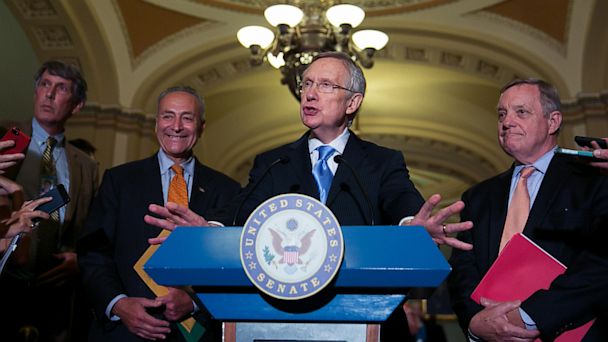No Agreement Reached, Senate Filibuster Fight Looms

Credit: Drew Angerer/Getty Images
A deeply divided Senate failed to reach agreement Monday night after more than three hours of discussion behind closed doors, raising the prospect that Democratic leaders were heading toward invoking the so-called nuclear option to confirm several of President Obama's top nominees whose confirmations have stalled.
As they left the Capitol after a rare bipartisan session, several senators told ABC News they were hopeful a resolution could be reached to the filibuster fight. The path remained highly uncertain, but advisers to Senate Majority Leader Harry Reid and Senate Minority Leader Mitch McConnell continued their discussions into the night.
"I think there's a genuine effort underway to try to find a way through this but we don't have that solution at hand," said Sen. Richard Durbin, D-Ill.
While Reid stepped before the cameras briefly, saying: "We've had a very good conversation. The conversation is going to continue," McConnell did not speak publicly after the meeting.
The Senate is still scheduled to begin a series of votes at later this morning at 11 a.m. on seven appointees whose nominations have been blocked by Republicans, setting the course for Democrats to change the rules in an extraordinary move that would end filibusters of executive branch nominees. It has lasting implications for the Senate, threatening to intensify the partisan rancor in Congress.
"If we don't solve this problem, we'll be the Hatfields and the McCoys on steroids before this is over," said Sen. Dean Heller, R-Nev. "I don't want that to happen."
For weeks, Reid has been threatening to invoke a plan known as the nuclear option, which would change Senate rules to allow an executive branch nominee to be confirmed by a simple majority of 51 votes, rather than the 60 votes normally required by the Senate. It would break filibusters for those nominated to serve in the Cabinet or the federal government, but would not include judges or legislation.
The stalemate has festered in the Senate, particularly over nominees to the National Labor Relations Board, the Consumer Financial Protection Board, the Export-Import Bank and the Environmental Protection Agency. Republicans have strongly objected to the confirmations, arguing that the labor board wields too much power and the nominations were improper because they were made while the Senate was not in session.
"I don't think at the end of the day any votes were changed but hopefully between now and tomorrow morning there will be some sort of a breakthrough," said Sen. John Thune, R-S.D.
The meeting, which started shortly after 6 p.m., drew to a close around 9:30 p.m. Dinner was not ordered, aides said, because they expected the session to be brief. But more senators spoke than expected, which stirred exasperation among some senators.
"Everything's been said, but not everyone has said it," Sen. Jon Tester, D-Mont., told ABC News as he walked through the basement of the Capitol after leaving the meeting.
"It got kind of repetitious," said Sen. Mike Johanns, R-Neb., who called the mood inside the room "good." He added with a smile, "We're all adults and professionals."
It was a rare gathering in the Old Senate Chamber, a ceremonial room steeped in history in the middle of the Capitol's second floor. The room, which was home to the Senate until 1859, has been the setting for previous contentious meetings, including one on Jan. 8 1999, when senators gathered to discuss how to conduct President Bill Clinton's impeachment trial.
The senators walked down the corridor of the Capitol, two-by-two, chatting with one another as they filed into the ornate red chamber. Most expressed pessimism when whether they expected a resolution to the impasse.
McConnell and Reid, the Senate's top two leaders whose feud has been steadily escalating, met privately for about 45 minutes before all senators convened for their rare bipartisan meeting. Time was running out for a deal, with Reid calling for an up-or-down vote as early as today on seven of the president's nominees who have been mired in gridlock.
In a speech earlier Monday, Reid said he would only use the simple majority for executive branch nominees. He downplayed suggestions a change in the rules would ultimately spell the end of the filibuster, an element of the Senate that makes it unique to the House. He said the move would "save the Senate from becoming obsolete."
"I love the Senate," Reid said, "but right now the Senate is broken and needs to be fixed."